chinese education
中国教育的好处的英文作文

中国教育的好处的英文作文Chinese education, with its rich cultural heritage and unique educational philosophy, has been instrumental in shaping the intellectual and moral landscapes of countless individuals. The system, while evolving with the times, retains its core values of respecting tradition, emphasizing discipline, and fostering a love of learning. In this essay, I will delve into the multifaceted benefits of Chinese education, analyzing its impact from various perspectives and standards.Firstly, Chinese education instills a strong sense of cultural pride and identity. From an early age, students are introduced to the vast treasury of Chinese history, literature, art, and philosophy. This immersive exposure not only broadens their intellectual horizons but also fosters a deep appreciation for their cultural roots. Such a foundation helps students develop a solid sense of self, understanding their place in the world and the responsibilities they bear as custodians of a rich cultural legacy.Secondly, the emphasis on discipline and rote learning in Chinese education has its distinct advantages. While some may criticize this approach as being too rigid or outdated, it cannot be denied that it helps students develop strong memories and a high level of concentration. This ability to retain and recall information is crucial in many fields, from the sciences to the humanities. Furthermore, the discipline instilled through regular attendance, homework, and testing prepares students for the rigors of higher education and professional life.Thirdly, Chinese education places a significant emphasis on moral and ethical development. The Confucian principles of benevolence, righteousness, and propriety are ingrained in the educational system, shaping students into well-rounded individuals who are not just academically proficient but alsomorally upright. This focus on character development is crucial in fostering a harmonious society where individuals respect each other and act with integrity.Fourthly, Chinese education excels in promoting collaborative learning and teamwork. In Chinese classrooms, students are often encouraged to work together on projects, discussing ideas and solving problems collaboratively. This approach not only enhances their communication skills but also helps them develop a sense of cooperation and shared responsibility. In today's interconnected world, these skills are increasingly important for success in both personal and professional life.Furthermore, the Chinese education system is highly competitive, which, while stressful, also spurs students to excel. This competitiveness, coupled with the system's emphasis on hard work and perseverance, helps students develop resilience and a strong work ethic. These qualities are invaluable in navigating the challenges of modern life and achieving personal and professional goals.Moreover, Chinese education is increasingly adapting to the demands of a globalized world. While maintaining its traditional strengths, the system is also incorporating modern educational technologies and international best practices. This integration allows Chinese students to benefit from both the depth and breadth of their cultural heritage while also preparing them to compete in the global arena.Lastly, the benefits of Chinese education are not limited to academic achievements but extend to personal growth and social development as well. Through their educational journey, students learn to navigate complex social relationships, develop empathy for others, and cultivate a sense of responsibility towards society. These skills and qualities are crucial for building a just and harmonious society.In conclusion, Chinese education offers a comprehensive and multifaceted approach to learning that benefits students in numerous ways. It instills cultural pride, fosters discipline and moral development, promotes collaborative learning, and prepares students for the rigors of a competitiveworld. As the system continues to evolve and adapt to new challenges, it remains a powerful tool for shaping the minds and hearts of future generations.。
2019年英语作文带翻译-中国的教育Chinese Education
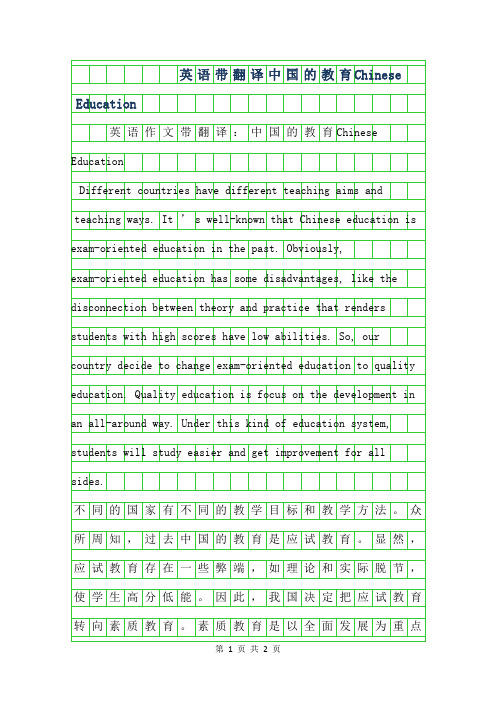
英语作文带翻译:中国的教育Chinese Education
Different countries have different teaching aims and teaching ways. It’s well-known that Chinese education is exam-oriented education in the past. Obviously, exam-oriented education has some disadvantages, like the disconnection between theory and practice that renders students with high scores have low abilities. So, our country decide to change exam-oriented education to quality education. Quality education is focus on the development in an all-around way. Under this kind of education system, students will study easier and get improvement for all sides.
不同的国家有不同的教学目标和教学方法。众所周知,过去中国的教育是应试教育。显然,应试教育存在一些弊端,如理论和实际脱节,使学生高分低能。因此,我国决定把应试教育转向素质教育。素质教育是以全面发展为重点。在这
谈谈对中国教育的看法英语作文
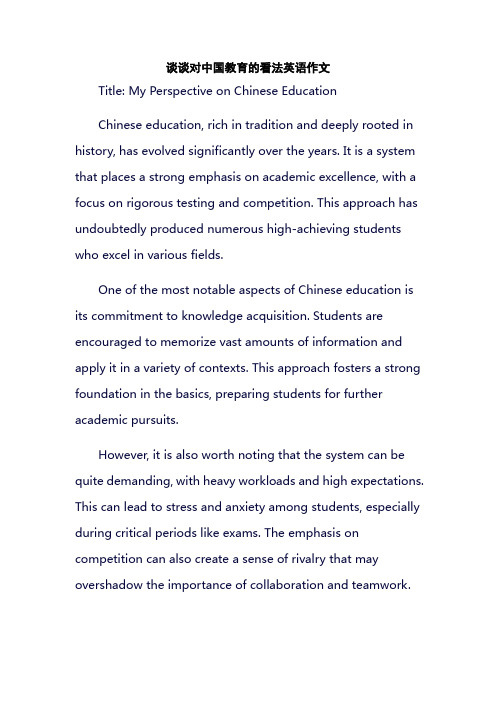
谈谈对中国教育的看法英语作文Title: My Perspective on Chinese EducationChinese education, rich in tradition and deeply rooted in history, has evolved significantly over the years. It is a system that places a strong emphasis on academic excellence, with a focus on rigorous testing and competition. This approach has undoubtedly produced numerous high-achieving students who excel in various fields.One of the most notable aspects of Chinese education is its commitment to knowledge acquisition. Students are encouraged to memorize vast amounts of information and apply it in a variety of contexts. This approach fosters a strong foundation in the basics, preparing students for further academic pursuits.However, it is also worth noting that the system can be quite demanding, with heavy workloads and high expectations. This can lead to stress and anxiety among students, especially during critical periods like exams. The emphasis on competition can also create a sense of rivalry that may overshadow the importance of collaboration and teamwork.In recent years, there has been a growing recognition of the need to balance academic excellence with the development of other important skills, such as critical thinking, creativity, and emotional intelligence. Many schools and educators are now exploring innovative teaching methods and curriculum designs that aim to foster a more holistic and balanced approach to education.Overall, Chinese education has its strengths and challenges. It excels in promoting academic excellence but could benefit from a more balanced approach that incorporates a wider range of skills and abilities. As the world continues to change and evolve, it is crucial that the education system adapts and innovates to meet the needs of the future generation.。
英语作文带翻译:中国的教育ChineseEducation
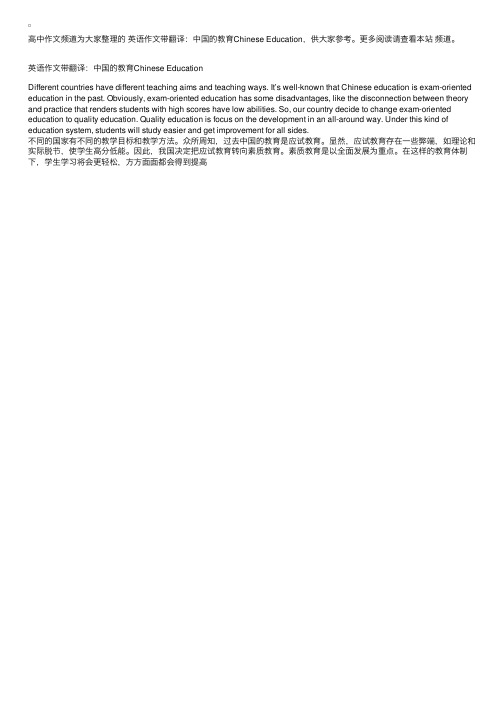
⾼中作⽂频道为⼤家整理的英语作⽂带翻译:中国的教育Chinese Education,供⼤家参考。
更多阅读请查看本站频道。
英语作⽂带翻译:中国的教育Chinese EducationDifferent countries have different teaching aims and teaching ways. It’s well-known that Chinese education is exam-oriented education in the past. Obviously, exam-oriented education has some disadvantages, like the disconnection between theory and practice that renders students with high scores have low abilities. So, our country decide to change exam-oriented education to quality education. Quality education is focus on the development in an all-around way. Under this kind of education system, students will study easier and get improvement for all sides.不同的国家有不同的教学⽬标和教学⽅法。
众所周知,过去中国的教育是应试教育。
显然,应试教育存在⼀些弊端,如理论和实际脱节,使学⽣⾼分低能。
因此,我国决定把应试教育转向素质教育。
素质教育是以全⾯发展为重点。
在这样的教育体制下,学⽣学习将会更轻松,⽅⽅⾯⾯都会得到提⾼。
我对中国教育的看法英语作文

My Perspective on Chinese EducationEducation, being the backbone of any society, plays a pivotal role in shaping the future of its youth. China,with its rich cultural heritage and historical depth, has always attached immense importance to education. Over the years, Chinese education has undergone significant transformations, evolving from traditional methods to more modern and innovative approaches. In this essay, I aim to delve into my observations and thoughts on Chinese education, highlighting its strengths, challenges, and potential areas for improvement.Firstly, the strength of Chinese education lies in its emphasis on comprehensive development. Unlike many other education systems that focus solely on academic performance, Chinese education strives to cultivate well-rounded individuals. This is evident in the integration of various subjects, including language arts, mathematics, science, social studies, and even physical education, into the curriculum. This approach ensures that students gain abroad range of knowledge and skills, enabling them tothrive in various aspects of life.Moreover, the Chinese education system places a strong emphasis on discipline and respect. The Confucian values of respect for elders, obedience, and loyalty are deeply ingrained in the educational process. This fosters aculture of respect and orderliness among students, who learn to value hard work, perseverance, and teamwork. These values are crucial for societal harmony and stability.However, despite its strengths, Chinese education also faces some challenges. One such challenge is the intense focus on exams and grades. The "gaokao," or college entrance exam, is a crucial milestone in the educational journey of Chinese students. While it serves as a fair and objective assessment tool, it often leads to excessive stress and a narrow focus on academic performance. This can stifle creativity, innovation, and the exploration of interests beyond academics.Additionally, the homogenization of education is another concern. The one-size-fits-all approach adopted by many schools fails to cater to the diverse needs andtalents of individual students. This can lead to a lack of motivation and engagement, as students may feel that theirunique abilities and interests are not being recognized or nurtured.To address these challenges, I believe that Chinese education should embrace a more holistic and inclusive approach. Firstly, it is crucial to prioritize the well-being and mental health of students. By reducing the excessive focus on exams and grades, students will be able to enjoy the learning process more, fostering a positive attitude towards education.Secondly, it is essential to recognize and cater to the diverse talents and interests of students. Schools should provide a wide range of extracurricular activities and elective courses to encourage students to explore their passions and develop their unique skills. This will not only enhance their overall development but also foster a more inclusive and vibrant school community.In conclusion, Chinese education has achieved remarkable successes in cultivating generations of well-educated and disciplined individuals. However, it faces challenges that require innovative solutions. By embracing a more holistic and inclusive approach, Chinese educationcan continue to thrive and shape the future of its youth in a positive and sustainable manner.**我对中国教育的看法**教育作为任何社会的支柱,在塑造其青年未来方面发挥着至关重要的作用。
中国教育利弊英语作文
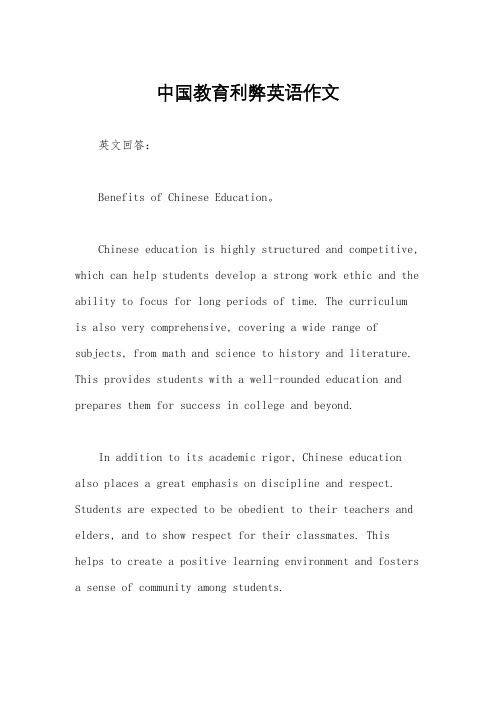
中国教育利弊英语作文英文回答:Benefits of Chinese Education。
Chinese education is highly structured and competitive, which can help students develop a strong work ethic and the ability to focus for long periods of time. The curriculumis also very comprehensive, covering a wide range of subjects, from math and science to history and literature. This provides students with a well-rounded education and prepares them for success in college and beyond.In addition to its academic rigor, Chinese education also places a great emphasis on discipline and respect. Students are expected to be obedient to their teachers and elders, and to show respect for their classmates. This helps to create a positive learning environment and fosters a sense of community among students.Another benefit of Chinese education is that it is often more affordable than education in other countries. This is especially true for international students, who can take advantage of the many scholarships and financial aid programs that are available.Drawbacks of Chinese Education。
中式教育的英语作文
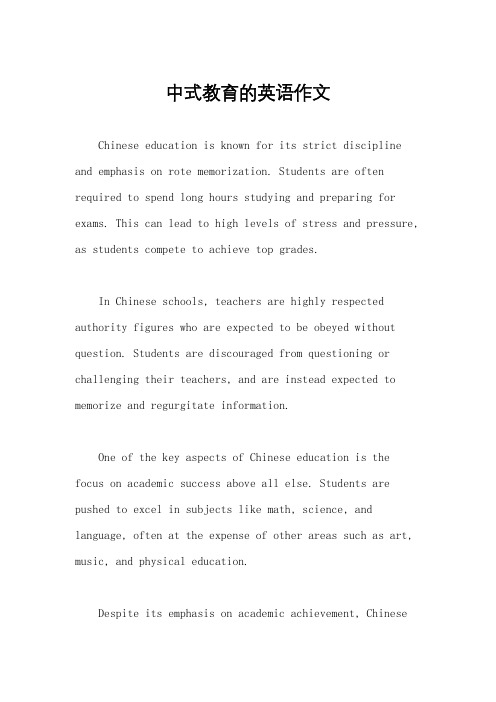
中式教育的英语作文Chinese education is known for its strict discipline and emphasis on rote memorization. Students are often required to spend long hours studying and preparing for exams. This can lead to high levels of stress and pressure, as students compete to achieve top grades.In Chinese schools, teachers are highly respected authority figures who are expected to be obeyed without question. Students are discouraged from questioning or challenging their teachers, and are instead expected to memorize and regurgitate information.One of the key aspects of Chinese education is the focus on academic success above all else. Students are pushed to excel in subjects like math, science, and language, often at the expense of other areas such as art, music, and physical education.Despite its emphasis on academic achievement, Chineseeducation has been criticized for stifling creativity and critical thinking skills. Students are often taught to follow rules and guidelines, rather than think outside the box or question the status quo.Overall, Chinese education has its strengths and weaknesses. While it may produce high-achieving students in certain academic areas, it may also limit their overall development and ability to think independently. It is important for educators to strike a balance between academic rigor and fostering creativity and critical thinking skills.。
中式教育的好处和坏处英语作文
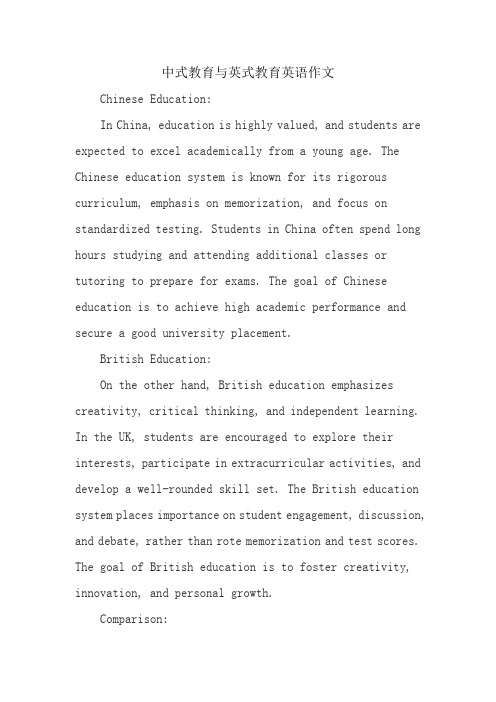
中式教育与英式教育英语作文Chinese Education:In China, education is highly valued, and students are expected to excel academically from a young age. The Chinese education system is known for its rigorous curriculum, emphasis on memorization, and focus on standardized testing. Students in China often spend long hours studying and attending additional classes or tutoring to prepare for exams. The goal of Chinese education is to achieve high academic performance and secure a good university placement.British Education:On the other hand, British education emphasizes creativity, critical thinking, and independent learning. In the UK, students are encouraged to explore their interests, participate in extracurricular activities, and develop a well-rounded skill set. The British education system places importance on student engagement, discussion, and debate, rather than rote memorization and test scores. The goal of British education is to foster creativity, innovation, and personal growth.Comparison:The Chinese education system and the British education system have distinct approaches to learning and student development. While Chinese education focuses on academic achievement and standardized testing, British education values creativity and independent thinking. Chinese students may excel in subjects like math and science due to their strong foundation in these areas, whereas British students may excel in subjects requiring critical thinking and creativity. Both systems have their strengths and weaknesses, and each can learn from the other to improve the overall quality of education.中文翻译:中式教育:在中国,教育备受重视,学生被期望从小就在学术上取得优异成绩。
中式教育的利弊英语作文简单

中式教育的利弊英语作文简单Chinese education is known for its rigorous academic standards and intense focus on exams. On one hand, this approach cultivates a strong work ethic and discipline among students. On the other hand, it can lead to high levels of stress and anxiety.中国教育以其严格的学术标准和对考试的强调而闻名。
一方面,这种方法培养了学生的强烈职业道德和纪律。
另一方面,它可能导致高水平的压力和焦虑。
The emphasis on rote memorization and exam scores in Chinese education can limit creativity and critical thinking skills. While students may excel at memorizing facts and formulas, they may struggle to think outside the box and solve real-world problems creatively.中国教育对死记硬背和考试成绩的强调可能限制了创造力和批判性思维能力。
虽然学生在记忆事实和公式方面可能表现出色,但他们可能难以跳出思维定势,创造性地解决现实世界的问题。
Another disadvantage of Chinese education is the pressure it puts on students to perform well academically. This pressure can lead to mental health issues such as anxiety and depression, as well as physical health problems like sleep deprivation and fatigue.中国教育的另一个缺点是它给学生施加了在学术方面取得好成绩的压力。
Chinese education 中国式教育

Chinese education
Chinese students often start preschool as young as three years old and do not eபைடு நூலகம்ter elementary school until they are six. Chinese believe that this time is crucial to personality development. Students are taught to play games, to dance, to sing, to act and to uphold the values of Truth, Kindness and Beauty.
Chinese education
China currently provides free university education. Students do not have to pay tuition fee and are provided with free on-campus dormitories. Grants or subsidies will be given to students whose families have financial difficulties.
Chinese education
Students have to complete both the primary school program and the junior middle-school program. Higher education is only for those students who have passed examinations of all levels. Student must pass the entrance examination for senior middle schools or middle-level technical schools. Many contests are organized annually in all levels to encourage their study. After two, three or four years, they have to go through national college entrance examination for admission to universities.
喜欢中式教育作文英文

喜欢中式教育作文英文I Love Chinese EducationEducation plays a vital role in shaping individuals and societies. It equips people with knowledge, skills, and values that are essential for personal and societal development. As a student who has experienced both Western and Chinese education systems, I have developed a strong preference for the Chinese education system.There are several reasons why I love Chinese education. Firstly, Chinese education places a strong emphasis on academic excellence. Students are taught to strive for the highest levels of achievement in various subjects, including mathematics, science, and languages. This focus on academic excellence has helped China produce a large number of highly skilled professionals and experts in various fields.Secondly, Chinese education promotes discipline and hard work. Students are expected to adhere to strict rules and regulations, including wearing uniforms, maintaining punctuality, and respecting teachers and classmates. This instills a sense of discipline and work ethic that is crucial for success in both academic and professional life.Furthermore, Chinese education encourages critical thinking and creativity. While rote memorization is still a common practice in Chinese schools, there is also an increasing emphasis on cultivating students' abilities to think critically, solve problems, and innovate. This helps students develop valuable skills that will serve them well in their future careers.Another aspect of Chinese education that I appreciate is the emphasis on holistic development. In addition to academic subjects, Chinese schools also provide opportunities for students to participate in extracurricular activities such as sports, arts, and community service. This helps students develop a well-rounded personality and cultivate a variety of interests and talents.Moreover, Chinese education places a strong emphasis on moral and ethical education. Students are taught to respect traditional values such as filial piety, honesty, and diligence. This helps instill a sense of moral responsibility and social consciousness in students, making them not only academically successful but also morally upright individuals.In conclusion, I love Chinese education because of its focus on academic excellence, discipline, critical thinking, creativity, holistic development, and moral education. I believe that these qualities are essential for producing well-rounded individualswho can contribute positively to society. While Chinese education system is not without its flaws, I believe that it has many strengths that are worth emulating in other education systems around the world.。
谈谈中国教育英语作文
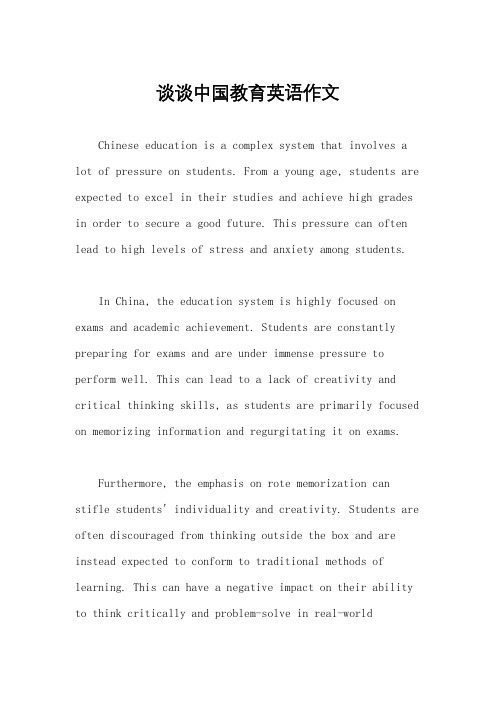
谈谈中国教育英语作文Chinese education is a complex system that involves a lot of pressure on students. From a young age, students are expected to excel in their studies and achieve high grades in order to secure a good future. This pressure can often lead to high levels of stress and anxiety among students.In China, the education system is highly focused on exams and academic achievement. Students are constantly preparing for exams and are under immense pressure to perform well. This can lead to a lack of creativity and critical thinking skills, as students are primarily focused on memorizing information and regurgitating it on exams.Furthermore, the emphasis on rote memorization canstifle students' individuality and creativity. Students are often discouraged from thinking outside the box and are instead expected to conform to traditional methods of learning. This can have a negative impact on their ability to think critically and problem-solve in real-worldsituations.In addition, the intense competition within the Chinese education system can lead to a lack of social and emotional development among students. They are often so focused on academic success that they neglect other aspects of their lives, such as socializing and developing interpersonal skills. This can have long-term consequences on their mental health and well-being.Despite these challenges, Chinese education also hasits strengths. The emphasis on hard work and dedication can instill a strong work ethic in students. Additionally, the focus on core subjects such as math and science can provide students with a solid foundation of knowledge in these areas.In conclusion, Chinese education has its pros and cons. While it places a strong emphasis on academic achievement, it can also lead to high levels of stress and a lack of creativity among students. It is important for theeducation system to find a balance between academic rigor and the holistic development of students.。
Chinese Education中国教育
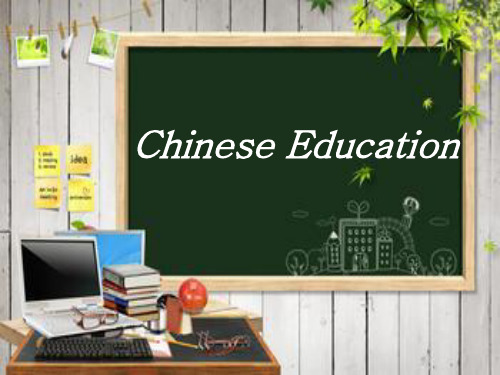
• 2005-2014, published more than 789 papers in provincial above, research projects for more than 157, won five provincial and ministerial level over the social science and natural science outstanding achievement award
If a student want to go to a competitive university. They need to obtain good marks on entrance examination scores and the have to pay a lots of effort.
• In 1989 ,the State Education Commission decided to implement the standardized test.(推行标准化考试)
• In 1996, implement the tuition consolidation and the tuition began to increase.(施行并轨招生) • In 2014,to reduce the examination subjects , Foreign language implemented several times every years(减少考试科目,外语一年多考)
school motto
“至善至美,自立自强”
理工大楼
微澜湖
图书馆
樱花坡
In this six years ,student usually learn these courses:
(完整版)英语作文ChineseEducation
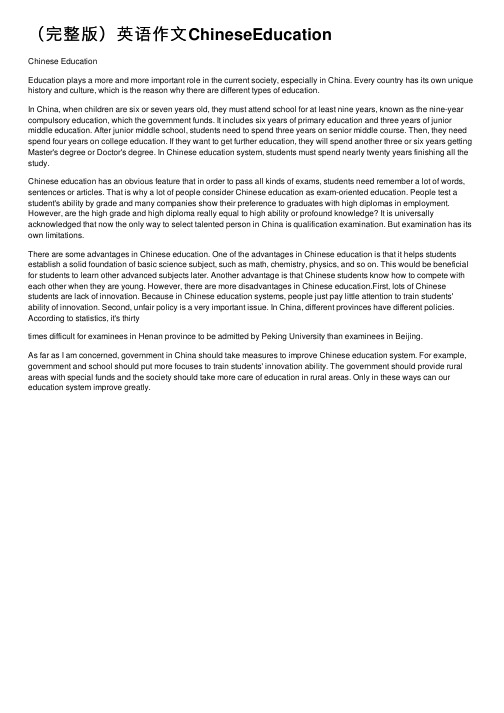
(完整版)英语作⽂ChineseEducationChinese EducationEducation plays a more and more important role in the current society, especially in China. Every country has its own unique history and culture, which is the reason why there are different types of education.In China, when children are six or seven years old, they must attend school for at least nine years, known as the nine-year compulsory education, which the government funds. It includes six years of primary education and three years of junior middle education. After junior middle school, students need to spend three years on senior middle course. Then, they need spend four years on college education. If they want to get further education, they will spend another three or six years getting Master's degree or Doctor's degree. In Chinese education system, students must spend nearly twenty years finishing all the study.Chinese education has an obvious feature that in order to pass all kinds of exams, students need remember a lot of words, sentences or articles. That is why a lot of people consider Chinese education as exam-oriented education. People test a student's ability by grade and many companies show their preference to graduates with high diplomas in employment. However, are the high grade and high diploma really equal to high ability or profound knowledge? It is universally acknowledged that now the only way to select talented person in China is qualification examination. But examination has its own limitations.There are some advantages in Chinese education. One of the advantages in Chinese education is that it helps students establish a solid foundation of basic science subject, such as math, chemistry, physics, and so on. This would be beneficial for students to learn other advanced subjects later. Another advantage is that Chinese students know how to compete with each other when they are young. However, there are more disadvantages in Chinese education.First, lots of Chinese students are lack of innovation. Because in Chinese education systems, people just pay little attention to train students' ability of innovation. Second, unfair policy is a very important issue. In China, different provinces have different policies. According to statistics, it's thirtytimes difficult for examinees in Henan province to be admitted by Peking University than examinees in Beijing.As far as I am concerned, government in China should take measures to improve Chinese education system. For example, government and school should put more focuses to train students' innovation ability. The government should provide rural areas with special funds and the society should take more care of education in rural areas. Only in these ways can our education system improve greatly.。
英语作文对中国教育
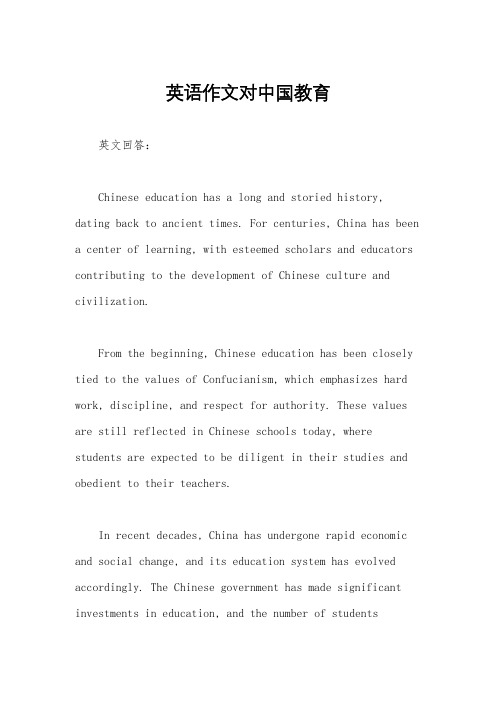
英语作文对中国教育英文回答:Chinese education has a long and storied history, dating back to ancient times. For centuries, China has been a center of learning, with esteemed scholars and educators contributing to the development of Chinese culture and civilization.From the beginning, Chinese education has been closely tied to the values of Confucianism, which emphasizes hard work, discipline, and respect for authority. These values are still reflected in Chinese schools today, where students are expected to be diligent in their studies and obedient to their teachers.In recent decades, China has undergone rapid economic and social change, and its education system has evolved accordingly. The Chinese government has made significant investments in education, and the number of studentsattending school has increased dramatically. In addition, the curriculum has been reformed to include a wider range of subjects, such as science, technology, and the arts.Despite these changes, Chinese education still faces a number of challenges. One challenge is the high level of competition for places in good schools and universities. This competition can lead to stress and anxiety for students, and it can also lead to a narrowing of the curriculum as students focus on the subjects that will help them succeed on standardized tests.Another challenge is the lack of access to quality education for students in rural areas. Rural schools often lack adequate resources, such as qualified teachers, up-to-date textbooks, and libraries. This lack of access can make it difficult for students from rural areas to compete with their urban counterparts.Despite these challenges, Chinese education is a pillar of Chinese society. Chinese schools continue to produce a well-educated workforce that is essential to the country'scontinued economic growth and social progress. As China becomes an increasingly globalized society, its education system will need to continue to adapt to meet the demands of the 21st century.中文回答:中国教育有着悠久的历史,可以追溯到古代。
英语作文 中国教育

英语作文中国教育Chinese Education。
Education in China has a long history and has been an essential part of Chinese society for thousands of years. The traditional Chinese education system has its unique characteristics and has made significant contributions to the development of Chinese civilization.The Chinese education system is known for its emphasis on academic excellence and discipline. Students areexpected to work hard and achieve high academic standards. This has led to a highly competitive environment in schools, with students striving to excel in their studies. The Chinese education system also places a strong emphasis on moral education, with students being taught the importanceof virtues such as honesty, integrity, and respect for others.In recent years, the Chinese government has madesignificant efforts to reform the education system tobetter prepare students for the challenges of the modern world. One of the key reforms has been the introduction of a new curriculum that focuses on developing students' critical thinking and problem-solving skills. This has been done in response to the increasing demand for highlyskilled workers in the global economy.Another important aspect of the Chinese education system is the strong emphasis on science and technology. China has made significant investments in education and research, and as a result, has become a world leader in fields such as engineering, computer science, and biotechnology. This has helped to drive China's economic growth and has positioned the country as a global leader in innovation and technology.Despite these strengths, the Chinese education system also faces several challenges. One of the biggest challenges is the high level of competition and pressure that students face. This has led to concerns about the mental health and well-being of students, with reports ofhigh levels of stress and anxiety among young people.Another challenge is the urban-rural divide in education. While urban areas have access to high-quality schools and resources, rural areas often lack the samelevel of educational opportunities. This has led to a significant disparity in educational outcomes between urban and rural students.In conclusion, the Chinese education system has a long and rich history and has made significant contributions to the development of Chinese society. While the system has many strengths, it also faces several challenges that need to be addressed. By continuing to reform and improve the education system, China can better prepare its students for the challenges of the modern world and continue to drive innovation and economic growth.。
中式教育和西式教育的区别英语作文

中式教育和西式教育的区别英语作文There are notable differences between Chinese education and Western education. 中式教育与西式教育之间存在显著的差异。
Chinese education is often perceived as more rigid and focused on rote memorization, while Western education is characterized by a more holistic approach that encourages critical thinking and creativity. 中式教育往往被认为更为刻板,侧重死记硬背,而西式教育则以更全面的方式为特征,鼓励批判性思维和创造力。
In Chinese education, students are typically expected to excel in standardized tests and adhere to strict rules and regulations. 在中国教育中,学生通常被期望在标准化考试中表现出色,并遵守严格的规则和条例。
This can create a high-pressure environment where success is often measured solely by academic achievement. 这可能会创造出一个高压力的环境,成功往往仅通过学业成就来衡量。
On the other hand, Western education places a greater emphasis on individualism and personal development, allowing students more freedom to explore their interests and talents. 另一方面,西式教育更加强调个人主义和个人发展,让学生更多地自由地探索自己的兴趣和才能。
中国教育的英语作文
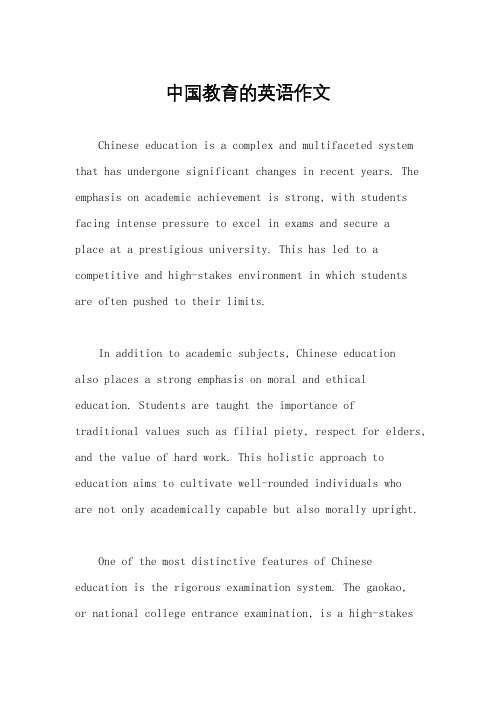
中国教育的英语作文Chinese education is a complex and multifaceted system that has undergone significant changes in recent years. The emphasis on academic achievement is strong, with students facing intense pressure to excel in exams and secure aplace at a prestigious university. This has led to a competitive and high-stakes environment in which students are often pushed to their limits.In addition to academic subjects, Chinese educationalso places a strong emphasis on moral and ethical education. Students are taught the importance oftraditional values such as filial piety, respect for elders, and the value of hard work. This holistic approach to education aims to cultivate well-rounded individuals whoare not only academically capable but also morally upright.One of the most distinctive features of Chinese education is the rigorous examination system. The gaokao,or national college entrance examination, is a high-stakestest that determines a student's future prospects. Success in the gaokao can open doors to top universities and lucrative career opportunities, while failure can have serious consequences for a student's future.Despite its strengths, Chinese education also faces a number of challenges. The focus on rote memorization and test-taking skills has been criticized for stifling creativity and critical thinking. In recent years, there has been a growing recognition of the need to reform the education system to better prepare students for the demands of the modern world.In conclusion, Chinese education is a complex and multifaceted system that places a strong emphasis on academic achievement, moral education, and rigorous examinations. While it has many strengths, it also faces significant challenges that will require thoughtful reform and innovation to address.。
